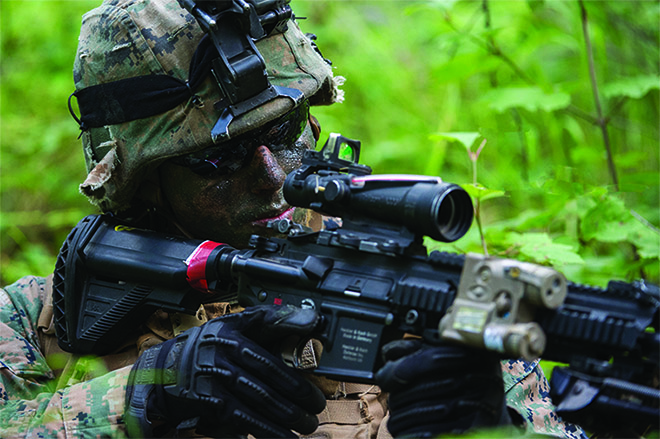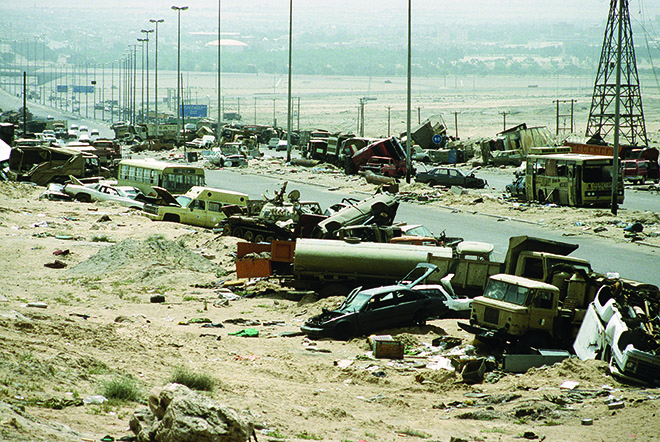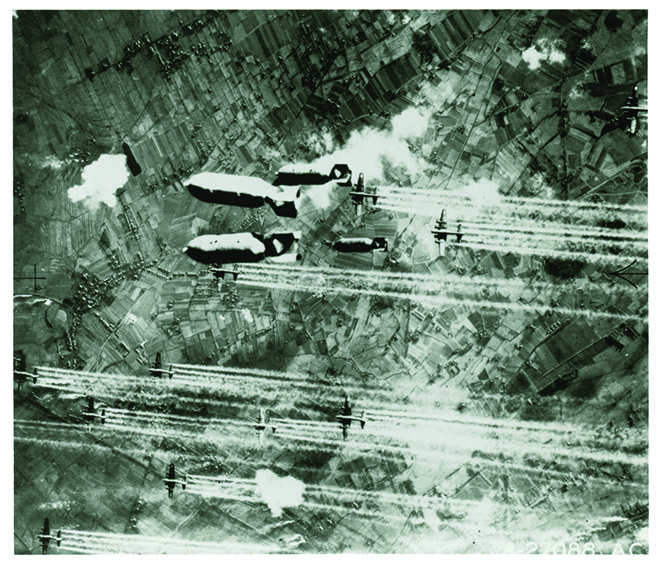 When is the United States going to do the killing necessary to beat its terrorist enemies or eliminate them entirely?
When is the United States going to do the killing necessary to beat its terrorist enemies or eliminate them entirely?
Those given the awful task of combat must be able to act with the necessary savagery and purposefulness to destroy those acting as, or in direct support of, Islamic terrorists worldwide. In 2008, then-Chairman of the Joint Chiefs of Staff Navy Admiral Michael Mullen said, “We can’t kill our way to victory.” Ever since, many have parroted his words. But what if Admiral Mullen was wrong? The United States has been at war with radical Islamists four times longer than it was with Nazi Germany and Imperial Japan in World War II. And those previous enemies were far more competent and aggressive than the terrorists. It is time to kill a lot more of them.
Too many commanders and their “operational law” judge advocates have neutered U.S. military forces with far too restrictive rules of engagement and investigations. 1 One Army infantry battalion commander reported that during a 15-month command tour in Iraq, he had to endure 600 AR 15-6 investigations (equivalent to a Navy JAG manual investigation), most of which examined the use of force by his troops. When asked when he had time to command, he answered, “Exactly.”
Human behavior has not changed much in recorded history. Neither have the basic tenets of war. It takes killing with speed and sustained effect to win wars. The notions that the U.S. military can win with “precision strikes” or “winning hearts and minds” are fantasy. Even the great victory in Operation Desert Storm was a bloody killing field. Just ask the remnants of the Tawakalna Division of the Iraqi Army.
During the American Civil War, the Union literally bled the Confederacy dry of fighting-age men. General Ulysses S. Grant’s Army of the Potomac killed its fellow Americans by the tens of thousands until General Robert E. Lee’s Army of Northern Virginia could not resist. It was that pressure that led Lee—arguably the greatest tactician on either side—to surrender. Grant killed his way to victory. He had the manpower advantage as well as the economic and industrial power to do so.
This country’s “Greatest Generation” killed enormous numbers of the enemy’s military servicemen and civilians in World War II. General Curtis LeMay knew that if he killed enough Japanese they would quit. While brutal by 2017 standards, his approach yielded lasting results—a productive peace with Japan that has lasted since 1945. The legal justification then—the sneak attack on Pearl Harbor—is the same casus belli as the one in the current war against al Qaeda and the Islamic State in Iraq and the Levant (ISIL): the 11 September 2001 sneak attack on the United States.
Had the United States not killed Japanese soldiers, sailors, and airmen in the hundreds of thousands, it is likely they would have fought on and the U.S. military would have been forced to kill millions in close ground combat until they finally quit. The United States and its allies did the same against Nazi Germany. While victory required taking and holding territory, the Germans and Japanese fought until it became clear to them that the Allies would keep killing them until they quit.
George MacDonald Fraser, author of the Flashman fiction series, was a foot soldier in British Field Marshal William Slim’s Army in Burma during World War II. In his memoir about that experience, Quartered Safe Out Here, Fraser wrote intimately as a military leader when justifying the dropping of atomic bombs on Hiroshima and Nagasaki:
I led Nine Section for a time; leading it or not, I was part of it. They were my mates, and I was bound by ties of duty. Now, take Nine Section as representing those Allied soldiers who would certainly have died if the bombs had not been dropped. Could I say, Grandarse or Nick or Foster were expendable, and should have died rather than the victims of Hiroshima? No. Never. And that goes for every Indian, American, Australian, African, Chinese and other soldier whose life was on the line in August 1945. So drop the bomb. 2
Sadly, this generation has pooh-poohed Fraser’s experience and beliefs. His experience, in what he acknowledged was another age, was that war was a job that needed to be done, one accomplished by his generation without relish but with a common sense and resolve since vanished from the public spirit. 3
President Harry S. Truman did not flinch to drop the atomic bombs on Japan, and all the caterwauling of the antiwar academics living off the largesse ensured to them by our Soldiers, Sailors, Airmen, Marines, and Coast Guardsmen cannot belie the efficacy and righteousness of his decision. 4 Hopefully, common sense and resolve have not vanished completely.
Even the strategic counterpoints—that the war against Islamic terrorists will not end or that it is not possible to kill enough of them to make a difference—ignore the victory of the Cold War. There, the United States and its allies maneuvered and exploited advantages until they beat the Soviet Union and the Warsaw Pact collapsed.
While the United States’ current enemies are so-called non-state actors, they have no trouble with their identity and moral agency. Yet U.S. military leadership still has not told its young men and women, “It’s okay to kill the enemy.” Moreover, the military does not celebrate its victories. How many ticker-tape parades have there been for Medal of Honor recipients in this war? When individual warriors are adjudged to have killed the “wrong” target, they face conviction and imprisonment rather than being given the benefit of the doubt, as so many were given during World War II. It is no wonder that post-traumatic stress disorder and suicide levels are so high. Instead of praising its victors, the United States browbeats them about civilian casualty numbers. 5 How does this strengthen the U.S. military’s moral agency?
 During Operation Desert Storm in 1991, coalition forces used a heavy hand against retreating Iraqi forces moving north from Kuwait back into Iraq. Destroying Iraqi Republican Guard units removed any future threat of Saddam Hussein invading his neighbors.
During Operation Desert Storm in 1991, coalition forces used a heavy hand against retreating Iraqi forces moving north from Kuwait back into Iraq. Destroying Iraqi Republican Guard units removed any future threat of Saddam Hussein invading his neighbors.
In August 2004, between the Battles of Fallujah I and II, during a conference at MacDill Air Force Base, a special forces officer from an Arab country said:
If you Americans want to win in Fallujah and Iraq, you need to call Al Jazeera and CNN, have them set up their cameras, then call out the insurgents to surrender from a surrounded Fallujah. If, in 24 hours, the insurgents do not come out, you then must make repetitive low-level bombing runs with your B-52s and flatten Fallujah. Then, and only then, the Iraqis will know they have been beaten. They do not yet know this.
At first, U.S. military officers were aghast at such a recommendation. Now, 13 years later, it seems this man might have been right. Edward N. Luttwak wrote of this in his seminal 1999 Foreign Affairs article:
An unpleasant truth often overlooked is that although war is a great evil, it does have a great virtue: it can resolve political conflicts and lead to peace. This can happen when all belligerents become exhausted or when one wins decisively. Either way the key is that the fighting must continue until a resolution is reached. War brings peace only after passing a culminating phase of violence. Hopes of military success must fade for accommodation to become more attractive than further combat. 6
Despite Luttwak’s article being a staple at U.S. military senior service schools, timidity seems to be the marching order among most flag and general officers today. This can be attributed to a false sense of moral superiority being bred into our senior leaders by repetitive exposure to civilian graduate schools, far too much legal oversight, and the mission creep that has polluted our warfighting capability since Operation Desert Storm.
Frantic to find ways to keep endstrengths at 1991 levels, all services started looking at new missions: nationbuilding; humanitarian assistance; foreign military training and assistance; and even hurricane relief. While U.S. forces can and have performed such missions admirably, they have done so at the expense of the art of killing.
Such squeamishness has many symptoms, not the least of which is putting infantry lieutenants in prison for allowing collateral damage to occur. 7 It would be impossible for Major Dick Winters of Band of Brothers fame to survive, much less thrive, in today’s military. This is sad and foreboding. Absent aggressive, free-thinking leaders at both ends of the spear, the U.S. military is doomed to failure.
Technology also creates a horrible environment for a Winters-like leader in today’s forces. Seemingly, every military action is caught on camera and later subjected to judgment in the clear vision of hindsight—always from the safe confines of a headquarters far removed from the battlefield. This insanity must end before the United States faces a peer competitor on a hot battlefield.
In addition to the overabundance of ill-trained lawyers in the force, leaders are giving too much credence to people and organizations (such as Amnesty International) with distorted views of how wars ought to be fought rather than how they truly are. For instance, the concept of proportionality under international law has nothing to do with making war a “fair fight” or using “minimum force.” Sadly, however, such human rights law language has crept into U.S. military standing rules of engagement (SROE), despite warnings from sage counsel such as international and operational law expert W. Hays Parks. 8
 In the mid-1990s, a small cadre of combat-experienced officers began to militate against overly restrictive rules of engagement and tactical directives. They advocated that if U.S. military forces must fight in such environments these warriors should at least have the same protections that U.S. constitutional law provides police officers in the United States. This still has not happened. Sixteen years and thousands of U.S. military lives have been lost, and the military still is plagued with obtuse rules of engagement and soul-crushing investigations into every action.
In the mid-1990s, a small cadre of combat-experienced officers began to militate against overly restrictive rules of engagement and tactical directives. They advocated that if U.S. military forces must fight in such environments these warriors should at least have the same protections that U.S. constitutional law provides police officers in the United States. This still has not happened. Sixteen years and thousands of U.S. military lives have been lost, and the military still is plagued with obtuse rules of engagement and soul-crushing investigations into every action.
In World War II, the United States and its allies did not hesitate to pursue all-out war against Japan and Germany. Here a formation of B-17 bombers drops ordnance on Bremen, Germany, in 1943.
The U.S. military needs to train its judge advocates to be competent in international law with a view toward bending it in favor of its forces. A great example is W. Hays Parks’ article that explains that farmers who make improvised explosive devices at night are direct participants in warfare and can be targeted at any time, wherever found, regardless of what they are doing or whether they are armed when found. 9 Despite this clear guidance from the doyen of international law (and a former U.S. Marine infantry company commander in Vietnam), most judge advocates choose to exercise their “power of no”—finding ways to hamper the killing of bad guys.
A U.S. Army special forces battalion commander solved this problem by sending his command judge advocate to live, work, and fight with one of the battalion’s operational detachments (ODAs) in downtown Baghdad. Three weeks later the judge advocate wanted to stay with the ODA to kill bad guys. When he returned to the battalion staff, he demonstrated that he learned the power of yes and sought ways to enhance the unit’s lethality and effectiveness.
While the United States may not be following the full-on nation-centric strategy of Alfred Thayer Mahan to fight terrorists today, it ought to use the military primarily to forward its national interests. And that ought not be a strange or unsavory concept to any U.S. warrior or citizen.
The military’s leadership has a responsibility to push back hard when told to do anything that would dilute the fundamental responsibility to win wars. For the past two decades, the U.S. military has put more effort into combating climate change and training to prevent sexual harassment than it has into training warriors to kill the enemy.
It is time for a shift away from the rudderless drift that has plagued the military since the end of the Cold War and Operation Desert Storm. Battle-hardened commanders who excel at killing too often are passed over for promotion in favor of those with multiple degrees from elite universities who self-select each other for advancement. Prayerfully, it will not take another Task Force Smith to set things right. 10
1. As an example, one Army Judge Advocate from the Center for Law and Military Operations told a 3rd Infantry Division audience, “Winning the counterinsurgency fight may mean our Soldiers get shot first before responding.” This is not the sole example of such thinking. At one point this same organization was touting a “shoot-to-wound” policy despite being shown the dangers and foolishness of such a tactic by the FBI Hostage Rescue Team and some of the best shooters from 1st Special Forces Operational Detachment-Delta (Delta Force).
2. Toby Young, “If the Bombing of Hiroshima Was a Moral Obscenity, Blame Emperor Hirohito,” The Spectator, 15 August 2015, quoting Fraser from Quartered Safe Out Here. Fraser, in an argument with another philosopher, also stated, “By what right, then, do you say that the Allies should have been sacrificed to save the victims of Hiroshima? Because what you’re saying is that, while you’re not willing to give your life, Allied soldiers should have given theirs, mine for one, possibly.”
3. George MacDonald Fraser’s Obituary, The Telegraph, 03 January 2008.
4. President Truman, President Roosevelt, and British Prime Minister Winston Churchill also did not flinch to firebomb enemy cities. While the bombing might be adjudged cruel or unnecessary in the comfort of hindsight, it is entirely possible that at least one of the authors would not be here had it not occurred, as his father was a Marine preparing for the invasion of Japan in August 1945. The invasion plan was assigned the cover name “Downfall” and consisted of two main operations: “Olympic,” the preliminary assault on the southern island of Kyushu, which was slated for 1 December 1945, and “Coronet,” the subsequent landing on Honshu, which was scheduled for 1 March 1946. The estimated number of deaths and injuries to U.S. Soldiers and Marines was more than a million. The projections for Japanese losses were approximately four million.
5. For example, the first and second slides briefed to the Commander, International Security Assistance Force Afghanistan, are often CIVCAS (civilian casualties).
6. Edward Luttwak, “Give War a Chance,” Foreign Affairs, July/August 1999.
7. The hypocrisy of this is underscored by the number of collateral damage “victims” wrought by senior civilian and military leaders’ decisions to hit single high-value targets (HVTs) with Predator-borne Hellfire missiles and Joint Direct Attack Munitions (JDAMs).
8. Rather than the Law of Armed Conflict that is derived from International Humanitarian Law. Hays Parks, “Deadly Force Is Authorized,” U.S. Naval Institute Proceedings, 127, no. 1 (January 2001), 32-37.
9. See W. Hays Parks, “Part IX of the ICRC ‘Direct Participation In Hostilities’ Study: No Mandate, No Expertise, and Legally Incorrect,” NYU Journal of International Law & Politics, 42, no. 769 (2010).
10. Task Force Smith was the name of the Army 1st Battalion 21st Infantry Regiment’s ill-fated attempt to gain a foothold in Osan, Korea, in July 1950 at the start of the Korean Conflict. Its disastrous ending led to the Army leadership catchphrase “No More Task Force Smiths” to counter the drawdown after Operation Desert Storm. The phrase is ridiculed by many frontline troops who suffer the consequences of slogans over substance.
No comments:
Post a Comment